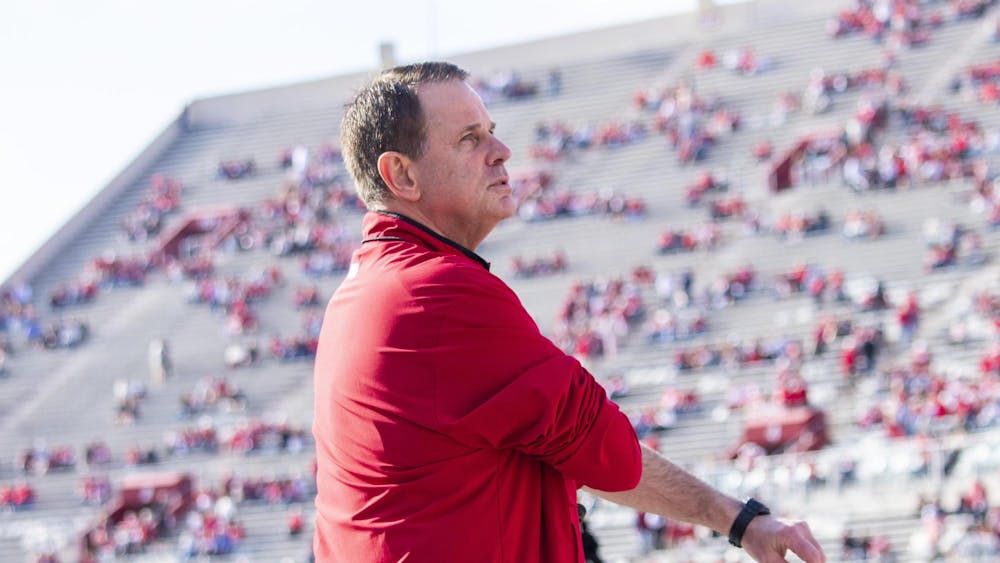When former athletics director Clarence Doninger retired last year, it wasn't purely by choice. \nHired in 1991 to assume leadership of the IU Athletics Department, Doninger held the position of director for just more than ten years before he was forced to retire under IU's mandatory retirement policy, which requires administrators to retire at age 65. \nAfter 60 years intact, the policy will be reconsidered Wednesday morning. Administrators will meet with linguistics professor Paul Newman and representatives from the U.S. Equal Employment Opportunities Commission at 9:30 a.m. in Bryan Hall to sign an agreement requiring the University to rewrite its stance on mandatory retirement. \nThe meeting stems from a complaint filed by Newman and the EEOC more than a year ago, in which the plaintiffs state IU is in violation of federal law by requiring administrators to retire on the basis of age. Newman claims University counsel has denied this assertion since the complaint was filed.\nNewman predicts the change will be embraced by IU faculty.\n"I have never met one person in the University who has defended it and said it made any sense," Newman said. "I can see having faculty rotate jobs to get young blood and new professors in. I can see having term limits to certain (administrative) positions. What I'm opposed to is discrimination because of chronological age."\nThe current University policy requiring administrators to retire at 65 can be waived by the president on a temporary, yearly basis.\nThe Age Discrimination in Employment Act of 1967 that protects employees from firing or mandatory retirement practices based on age. The act, however, does not apply to state employees. And the Supreme Court has never ruled age discrimination unconstitutional. \nUniversity counsel Dottie Frapwell the EEOC resolution would not kill the retirement policy -- it would merely ask the University to rewrite the policy.\nBut to Newman, the agreement means IU will change the policy.\n"What the agreement will require is the rewriting of the policy so that, in effect, 95 percent of people affected before by it won't be now," he estimated.\nMandatory retirement practices have been abolished at most U.S. universities since 1994, according to a study by Harvard University's Graduate School of Education.\nBut the mandatory retirement age saves money that IU needs. IU faces a payout of $2 billion over the next 30 years to professors who retired before the 18-20 plan was terminated 12 years ago, according to The Associated Press. The plan -- instituted about 40 years ago -- promises five years' salary after retirement to professors who worked at IU for at least 20 years. \nAs a result of the steep 18-20 costs, new employees' retirement packages are cut by a third, and departments shoulder 20 percent burden, according to the AP. \nThe mandatory retirement limit plays into the equation as a money-saving method, affecting hiring practices as well. \n"You want to hire as many junior people as you can…Unless you feel it's very important to hire a senior professor, you'll try to get a younger person," Kumble R. Subbaswamy, dean of college of arts and sciences, told the IDS in August. \nIn fact, former Dean of the College of Arts and Sciences Morton Lowengrub left IU after 32 years under mandatory retirement -- only to assume a position at Yeshiva University in New York as vice president for academic affairs.\nDoninger, who was asked to support the EEOC resolution and declined to do so, said he was unaware mandatory retirement policies applied to him when he accepted the position of athletics director. Doninger said he was not aware the policy affected his job. \n"It was a surprise," he said. Though Doninger accepted the policy and retired at 65, he feels reconsideration of mandatory retirement practices is long overdue.\n"I did not contest the policy because I've supported IU for years," Doninger said. "I did disagree with the policy, and I think it is appropriate that the University now reverse itself on that."\nNewman approves of IU's sex and gender-based policies regarding discrimination, but said he can't understand why the University defends age-based mandatory retirement.\n"I can't believe I'm the first person to bring this up," Newman said.
Mandatory retirement questioned
Clock now stops at age 65; policy faces University, government scrutiny
Get stories like this in your inbox
Subscribe




